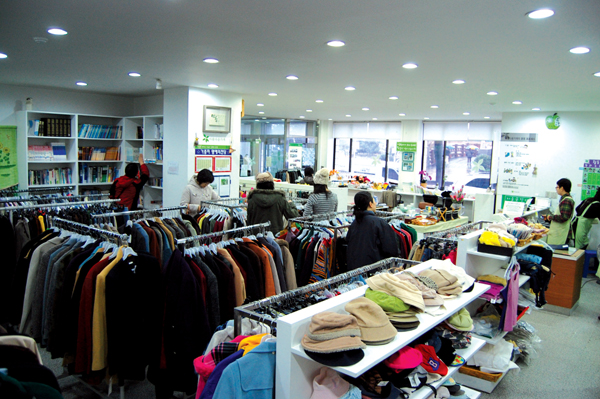
- Updated 2024.4.24 17:16
- All Articles
-
member
icon
-
facebook
cursor
-
twitter
cursor
| |
 |
|
| ▲ The Beautiful Store offers those who donate and shop there the opportunity to recycle and reuse pre-loved items. Photo by Darryl Coote |
With the moving season upon us and a New Year influx of foreigners to the island, the question of where to find cheap necessities and supplies becomes of upmost importance. There is much chatter within the foreigner community and on Web sites such as rhymeswithjeju about the location of second-hand stores, but for the most part the responses are vague or are simply postulations on where one might have been spotted once. So why are there so few second-hand stores in Korea?’
“I think that there are some cultural conceptions from when we were poor,” said Kim Seung Pyo, manager of the Beautiful Store, a second-hand shop on Jeju. “We would wear anything just to survive, but since Korea has improved a lot and people have more and more money they think, ‘Why do I have to use stuff that other people used when I can buy new products?’ It is about pride and cultural backgrounds.”
Kim said that the stigma accorded to second-hand stores and reusing clothing, furniture and appliances is a reaction to the war years when Korea’s citizens would recycle and reuse everything they could.
Due to Korea’s rapid development, the need to reuse has lessened and doing so is reminiscent of the times when there was no option.
“But,” Kim said, “ever since the beautiful store started and has been introduced in the media, people’s perceptions are gradually changing.”
Kim believes that compared to Koreans on the mainland, “Jeju people are more open to reusing products because, historically, it is an island, so it’s a bit isolated from the rest of the country and because the land was very sterile, people were used to sharing things and reusing things and giving things to people who needed them.”
The Beautiful Store, which has two outlets on Jeju, is a non-profit organization that donates all its proceeds to those in need within the community. Founder Park Won Son, a lawyer from Seoul, became aware of the Oxfam charity when he studied in England, and it became the inspiration and business model for The Beautiful Store.
“It started as a table on the street in 2001 and now there are 107 stores throughout Korea,” Kim said.
| |
 |
|
| ▲ Manager Kim Seung Pyo, above right, and volunteer workers welcome all visitors to the store. Photos by Darryl Coote |
In 2009, the two stores on Jeju raised 100 million won and were able to help more than 100 people on the island. People that want to apply for assistance can apply by filling out a form that can be picked up from one of the stores or off the Internet. Those that are eligible are people receiving welfare assistance, orphans, those with high medical bills and nongovernmental organizations that are on tight budgets.
Due to the inability to help everyone that applies, a council of 10 to 15 professors, social workers and charity personnel go through all the applications and distribute money every six months to those deemed to be the most in need.
Except for the manager, The Beautiful Store is staffed by volunteers and all merchandise is locally donated, which is different from other second-hand stores on the island that pay their staff and purchase most of their wares from Dongdaemun in Seoul. This keeps The Beautiful Store’s constantly changing, which attracts a wide clientele, from those looking for inexpensive clothes to antique and bargain hunters.
Some of the unusual items that have passed through their doors have included an antique Korean chamber pot, an antique iron and several very rare books.
Since the store opened almost four and a half years ago, it has evolved from a destination for bargain-hunters and a charitable organization to also being a place where Jeju’s homeless can congregate without being subjected to prejudice or malice.
“There are lots of homeless people around this store and they come to the store to talk together,” Kim said. Tea and coffee are offered as well as a place to escape the elements to those in need. Kim talks fondly about this particular function of the store and believes that through having a safe and clean place to go, those down on their luck feel comfortable and talk to the volunteers and that through being compassionate the store also provides psychological support. “I think it is one of the most important qualities of the beautiful store,” he said.
Used clothing, books, furniture and other unwanted goods can be donated and a tax receipt given in return by either dropping the items off at the store or, if there is too much to transport, The Beautiful Store will arrange to have it collected.
The Beautiful Store 10:30 a.m. to 6 p.m. every day except Sundays and holidays - 1196-3 Ido-1dong, Jeju City Tel. 064-759-8004 - 907-5 Nohyeongdong, Jeju City Tel. 064-749-0038
(Translation by Hyun Hee Weon)
|
|
|
|
|
|
|
|
ⓒ Jeju Weekly 2009 (http://www.jejuweekly.net)
All materials on this site are protected under the Korean Copyright Law and may not be reproduced, distributed, transmitted, displayed, published without the prior consent of Jeju Weekly. |
|
|
|
|
| Jeju-Asia's No.1 for Cruise |
|
|
|
Title:The jeju Weekly(제주위클리) | Mail to editor@jejuweekly.net | Phone: +82-64-724-7776 Fax: +82-64-724-7796
#503, 36-1, Seogwang-ro, Jeju-si, Jeju-do, Korea, 63148
Registration Number: Jeju, Ah01158(제주,아01158) | Date of Registration: November 10,2022 | Publisher&Editor : Hee Tak Ko | Youth policy: Hee Tak Ko
Copyright ⓒ 2009 All materials on this site are protected under the Korean Copyright Law and may not be reproduced, distributed, transmitted, displayed, published
without the prior consent of jeju weekly.com.

|





















